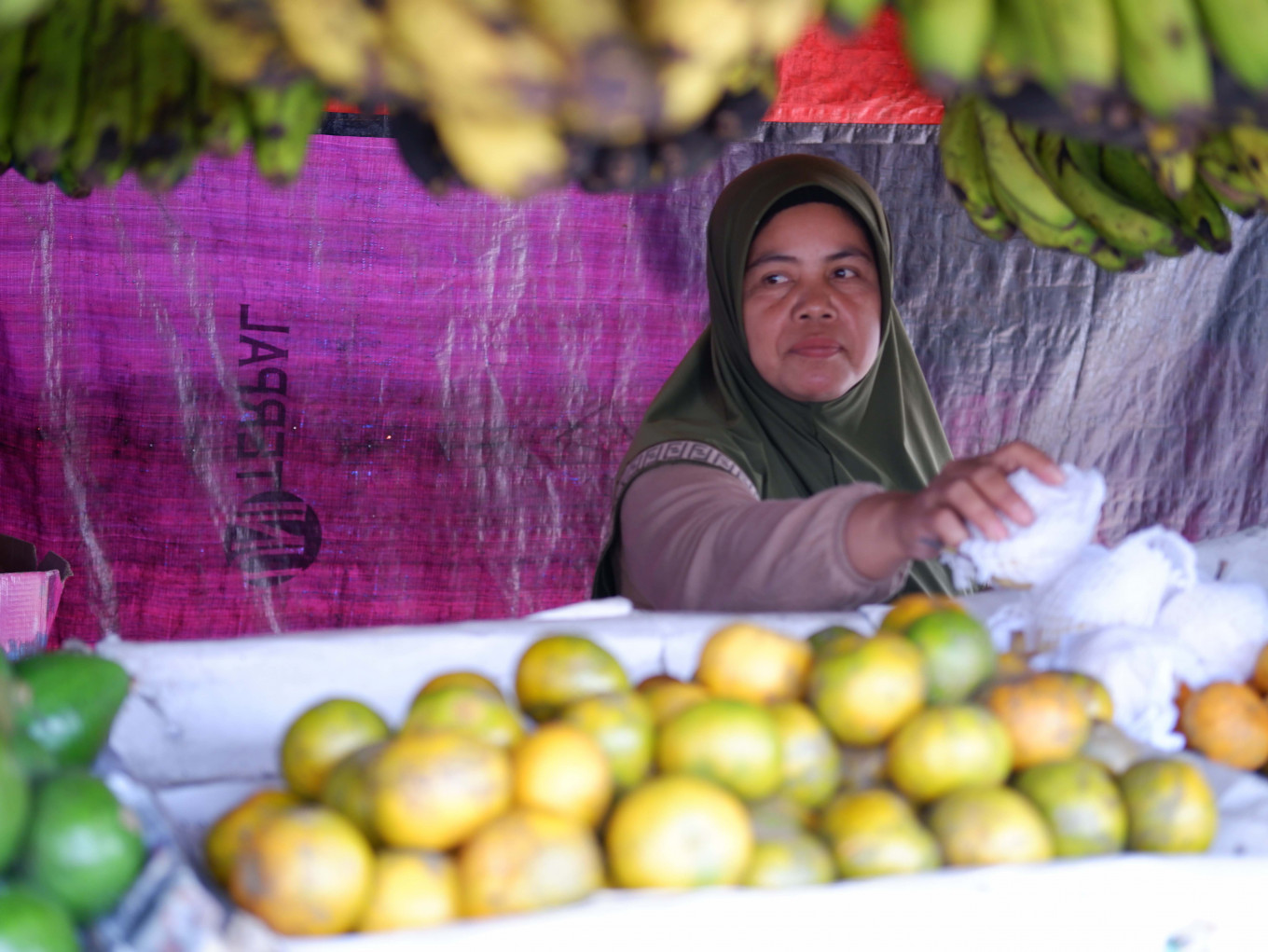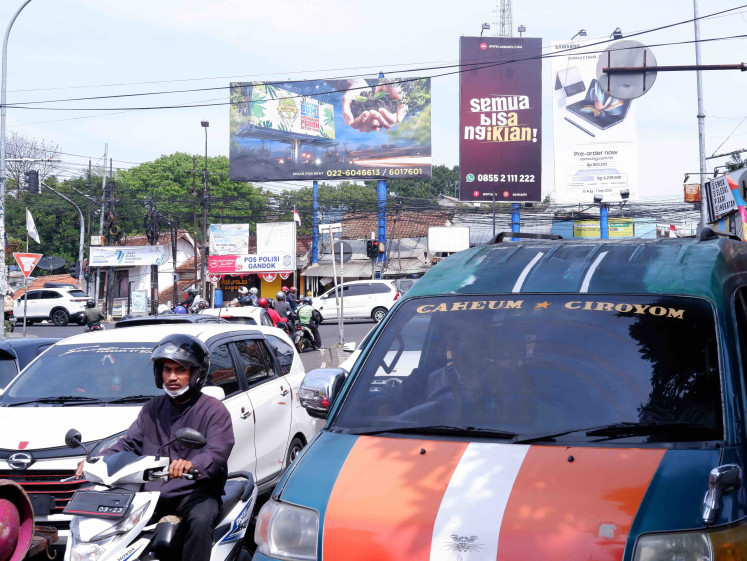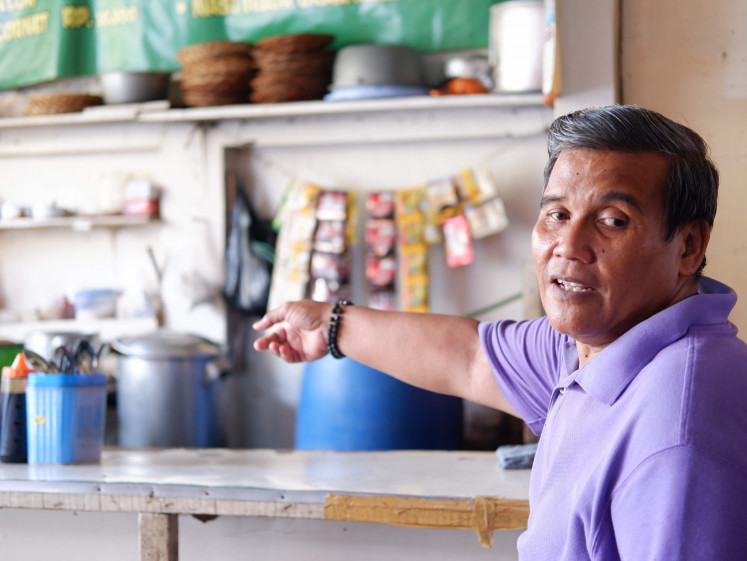Popular Reads
Top Results
Can't find what you're looking for?
View all search resultsPopular Reads
Top Results
Can't find what you're looking for?
View all search resultsLife at Bandung’s iconic Gandok intersection
Change text size
Gift Premium Articles
to Anyone

A peek into the world of the locals who’ve spent their lives on one of Bandung’s major streets, Pertigaan Gandok.
As one of the major intersections in Bandung, Pertigaan Gandok (Gandok intersection) is a sentimental place for locals and students from outside of the city alike. While it is home to many shops and stalls—some of which have been around serving the same food since the ‘70s—it is also a witness to the life stories of the locals living in the urban villages hidden behind the main roads of Siliwangi, Cihampelas and Ciumbuleuit.
Ready to lose
“People are really willing to get old on the road,” a pedestrian at the Gandok intersection said while tutting.
He was complaining about the traffic jam. On weekends, the intersection is usually flooded with out-of-town cars, heading north toward Lembang district, a major tourist destination in Bandung.
“Well, I’m getting old on the road, too [laugh],” chimed Cucu, a kupat tahu (rice cake and tofu dressed in peanut sauce) vendor at the intersection.
“I’m sorry, I didn't mean it that way,” the pedestrian responded as he continued walking toward Jl. Cihampelas.
Cucu and her husband, Dani, have been selling their kupat tahu from Singaparna at the intersection since 2001. “But we were not married yet back then,” Dani added. His lips puckered, sucking in the smoke from a clove cigarette he had just lit. They were married a year after and moved not far from their current stall’s location in Gandok.
In the past, Dani, who worked as a technician specializing in water-heating appliances, frequented a warung (food stall) near his boarding house where he often rested his legs and paid for cups of instant coffee, cigarettes and kupat tahu on credit. The warung’s proprietor was Cucu’s mother.
“She was a really kind person,” Dani reminisced. Cucu, listening in on the conversation, smiled as she prepared five portions of kupat tahu for a customer waiting in a car parked next to their stall.
“Don’t put any sambal in it please,” cried the customer over the roar of passing cars, climbing the inclining intersection.
Born in Bandung but sent back to her hometown, Singaparna, Tasikmalaya, West Java, to attend school by her mother, Cucu came back in 1998 and immediately started helping at her mother’s shop where she met Dani. Cucu’s mother died two weeks after they were married in 2002.
“Mom passed her recipes on to him before she died,” Cucu said, nodding her head toward Dani.
A plate of their kupat tahu cost Rp 1,500 (10 US cents) back in 2001, and rose to, at its highest back then, Rp 8,000 by 2004 before finally reaching Rp 10.000 in 2009, where it mostly stayed until now, barring some temporary rises. Both Cucu and Dani, however, have never failed to lower the price when the opportunity has arisen.
“It’d be sad if the locals here could not afford our kupat tahu,” Cucu said.
“There are lots of stories here in Gandok. Stories of struggles,” Dani followed. “We need to be ready to lose. Be ready for losses.”
Despite their slim margin, however, they have not suffered any losses. “If our intention is good, people will send us good prayers.”
They noted that former student customers always went back there, bringing their friends or family every now and then.

The caring hawkers
Cucu and Dani’s kupat tahu stall shares the same spirit with another shop just a stone’s throw away toward Jl. Ciumbuleuit: Warung Pak Ubed. The owner, Ubed, opened the shop in 1978 selling instant noodles and coffee in addition to its mainstay bubur kacang hijau (sweet mung bean porridge), bubur ketan hitam (black glutinous rice porridge), nasi goreng (fried rice), mie tektek (Javanese noodle dish) and soto ayam (chicken broth soup).
These days, Ubed runs the shop 24 hours a day with eight employees running on shift. “But I don’t go on night shifts anymore,” said Ubed as he poured porridge into a bowl. “My son usually takes [the night shift].”
Behind him, one of his employees was stirring a 45-centimeter tall dandang (a large pot used to cook big batches of porridge) filled with boiling black glutinous rice. His porridges, which he sells for Rp 6.000 a bowl, fill the bellies of day laborers, university students studying late into the night, employees working graveyard shifts and even cyclists on Bromptons coming in right after sunrise.
Ubed keeps his prices lower than other sellers, maintaining just enough of a margin to sustain the shop’s operations and keeping the prices affordable for the locals. It is common to see him giving extras free of charge, usually on bare minimum orders. Extra fried eggs for an order of a half portion nasi goreng, for instance.
Right across the road from Ubed’s shop, Iis, a former school teacher, runs a small nasi uduk (rice cooked with coconut milk) and nasi kuning (rice cooked with turmeric) stall with a similar mindset.
“I can tell if someone will be sharing the food they buy,” said Iis. She always adds more to the portion, without charge, in response to her instincts. “I don’t want people getting hungry.”

The peddling mother and the begging mother
An old woman, walking slowly with a cane in hand, approached Cucu and Dani’s kupat tahu stall. After Cucu helped her up the step, she rested on a stool next to Cucu and pulled a Rp 50.000 note out of her pocket. “This is my allowance for the day,” the woman said with a grin.
“I was born in Subang, 1951, but I moved here when I was five years old, [in] 1956,” said Anyi. She is one of the most senior members of the community in Gandok.
“Gandok wasn’t like this at all,” she continued. “There was a big tree right in the middle of the intersection. There was only one car back then, an oplet [a mode of public transport in 1950s Indonesia].”
Anyi was a newspaper and magazine peddler in the past, but decided to stop in 2012 due to the declining demand in print and her legs’ declining condition. Now, she rents out her residence, located right at the intersection, to tombstone makers.
“It’s for my pension,” Anyi chuckled. Her family acquired the 57-meter-square lot where her house sat through bartering. “We traded it with a gold necklace back in the ‘60s. It used to be 78 [m2] but […]”
“Give me some money. I’d like to drink some coffee,” Teti, the local panhandler, cut Anyi off as she was speaking, stretching out her sunburnt arm in front of Anyi’s face. Anyi looked up and laughed.
“I don’t have any,” said Anyi to Teti.
“What’s that in your hand?” Teti points to the Rp 50.000 note on Anyi’s hand.
“I don’t have anything other than this. I’m not giving you this.”
“Well then spend it for change.”
Cucu then prepared a portion of kupat tahu for Teti. She took it and went away after trying one more time. “Hey, you should be grateful,” said Anyi as Teti walked away.
“Teti was orphaned when she was little. Her parents were tailors, very prestigious back in the day. She hasn’t been well ever since, mentally, but she managed to get all three of her children through school by herself,” said Anyi, reminiscing about Teti’s parents.
“I often saw her sleeping on the streets, exhausted. It always reminded me of a mother’s struggle. I’m grateful, even though these legs ended up like this, that I can live for my children.”
“Where’s my coffee money?” said Teti, as she came back with a banana in her hand.
“Astaghfirullah [Dear God]. I should just punch you,” said Anyi jokingly.









